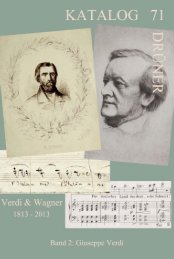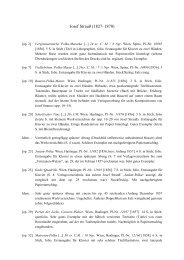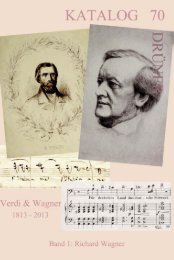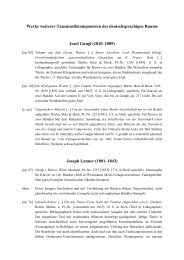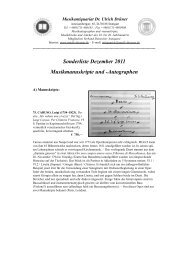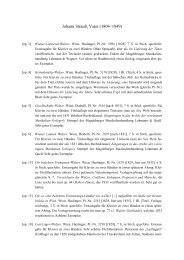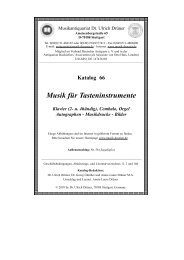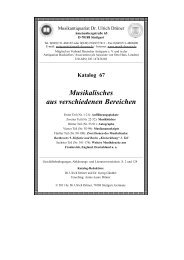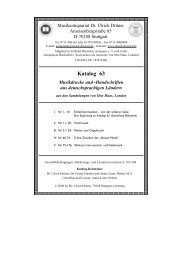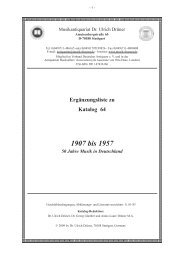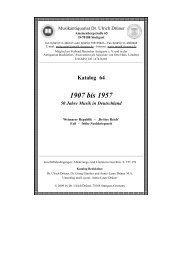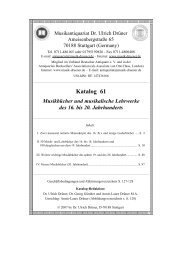Baronin Talleyrand - Musikantiquariat Dr. Ulrich Drüner
Baronin Talleyrand - Musikantiquariat Dr. Ulrich Drüner
Baronin Talleyrand - Musikantiquariat Dr. Ulrich Drüner
Erfolgreiche ePaper selbst erstellen
Machen Sie aus Ihren PDF Publikationen ein blätterbares Flipbook mit unserer einzigartigen Google optimierten e-Paper Software.
- 5 -<br />
The <strong>Talleyrand</strong> Music Collection<br />
The <strong>Talleyrand</strong> Music Collection was probably founded in 1785 by Marie-Louise-Fidèle<br />
Baronne de <strong>Talleyrand</strong>-Périgord, a very experienced singer and harp player. She married General<br />
Louis-Marie de <strong>Talleyrand</strong>-Périgord, (1738-1799), the uncle of the “Great <strong>Talleyrand</strong>”,<br />
(Napoleon Bonaparte’s Chancellor and Minister). General <strong>Talleyrand</strong> was the French Ambassador<br />
to the King of Sicily, in Naples from 1785, and was intended to be a political counterpart<br />
to the strong English influence at the Neapolitan court.The <strong>Talleyrand</strong>s, one of the great<br />
families in South-Western France since the Middle Ages, was now becoming one of the most<br />
influential in French political life since the late 18th century.Whilst General <strong>Talleyrand</strong> was<br />
occupied with Neapolitan politics, his wife, however, seems to have spent most of her time<br />
at San Carlo, the most important of the Neapolitan Opera Houses. She was obviously closely<br />
acquainted with Paisiello, since some autographs are included in the <strong>Talleyrand</strong> Collection.<br />
Through the political connections of the <strong>Talleyrand</strong>s, Paisiello was appointed Court composer<br />
to Napoleon, in 1802. After General <strong>Talleyrand</strong>’s death in 1799, the family collections<br />
were brought to France and both kept and considerably enlarged by the son, Auguste-Louis<br />
de <strong>Talleyrand</strong>-Périgord (1770-1832). He became Napoleon’s Chamberlain in 1802, and in<br />
1808, Ambassador in Germany and Switzerland. He was also a serious composer and wrote<br />
five full operas and many other vocal compositions.<br />
An important section of the <strong>Talleyrand</strong> collection was devoted to the works of Giovanni<br />
Paisiello. Among these fine 68 leather bound volumes (with c. 20,000 pages), written mostly<br />
between 1785 and 1800, are 17 full scores of complete operas (14 of them unpublished);<br />
in addition there are substantial parts or extracts of 36 further unpublished operas. From<br />
Paisiello’s approximate 90 operatic works, 52 are represented in the collection. Since these<br />
manuscripts are among the most important sources for Paisiello’s work outside Neapolitan<br />
and Parisian libraries, they have been considered as a complete entity which cannot be offered<br />
here en détail. – Further large sections of our collection contain operatic manuscripts of<br />
Paisiello’s Italian contemporaries, as well as a large section of French operas from the second<br />
half of the 18th century in full scores, which are now somewhat rare.Among them, there are<br />
30 operas by Grétry, who seems to have had, with the exception of Paisiello, the strongest<br />
influence on Louis Auguste de <strong>Talleyrand</strong>, as a composer.<br />
Surprisingly, there are a great deal of Viennese music editions, among them many first editions<br />
of works by Beethoven, Haydn and Mozart.When the <strong>Talleyrand</strong>s returned to Paris in<br />
1799, these editions were already “antiquarian” ones since they were mainly printed in the<br />
1780s and 1790s. Several Viennese manuscripts, which may be dated c. 1810-1820, suggest<br />
an explanation: Surely, Louis Auguste de <strong>Talleyrand</strong> was in the retinue of his celebrated cousin,<br />
Charles-Maurice (who soon became Prince of Benevent) during the Vienna Congress,<br />
1814-1816. But whilst Charles Maurice was brilliantly enhancing French interests, Louis<br />
Auguste seems to have preferred the Viennese music shops, buying Haydn and Mozart<br />
there… – The most recent part of the collection was acquired between 1805 and 1820 and<br />
contains representative series of Parisian publications of the collected chamber music works<br />
by Boccherini, Haydn, Mozart and Pleyel – and finally, works by the young Beethoven as well.<br />
The multiplicity of the <strong>Talleyrand</strong> collection is the most striking characteristic of its admirable<br />
cohesion: Its roots, Naples, Paris,Vienna, reflect the internationality, the free spirit and<br />
the artistic understanding of that family, which was at the height of French nobility and<br />
among the great names in European politics, during the first decades of the 19th century. At<br />
a time when the continental bourgeoisie already leant towards early nationalist movements,<br />
European spirituality still permeated the <strong>Talleyrand</strong> family.<br />
In the market of antiquarian music, no library of comparable importance, deriving from<br />
the European nobility, has come to light during the last three decades. Hence, this catalogue<br />
not only reflects the content of that collection, but also attempts to embody the musical life<br />
of such a great family, reflecting their contemporary taste.



